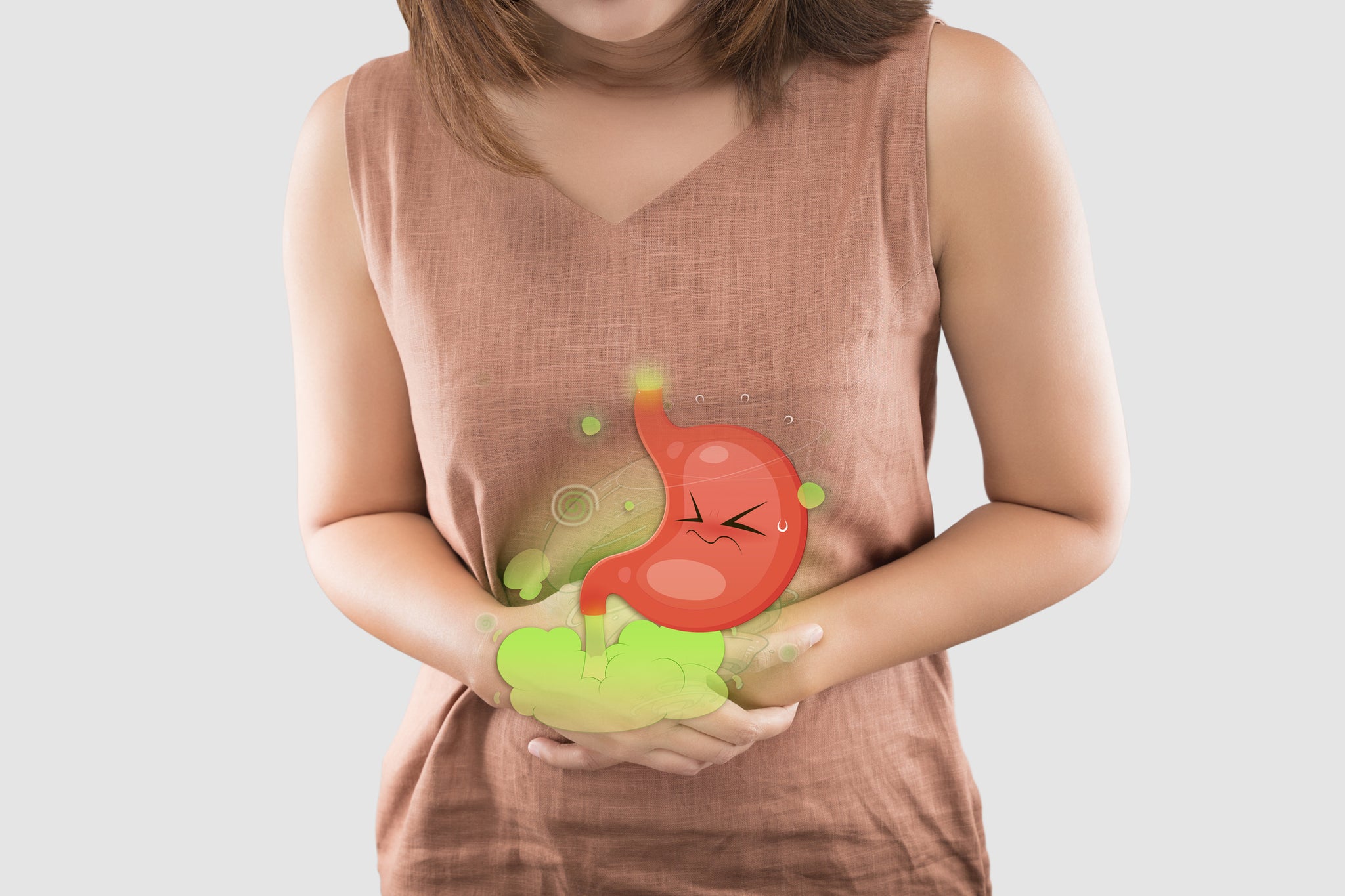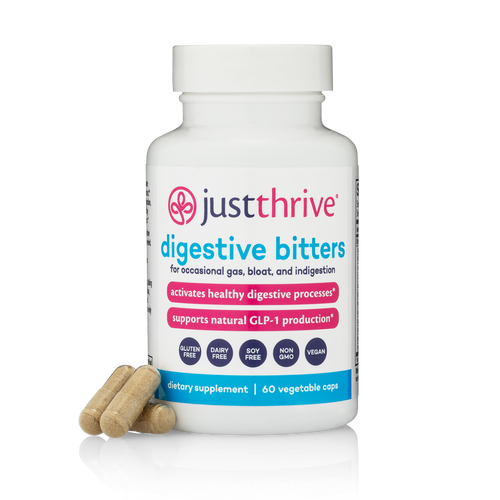Let’s face it: Farting comes with its share of embarrassment. Even though it’s a totally normal, natural thing… And even though every single person passes gas... When we’re in public or around people we don’t know, the standard protocol is to hide or hold in our farts.
But what happens if you fart frequently (far more than you think is normal for you)? Likely life is just a little bit harder. Perhaps you feel ashamed, or like there’s something wrong with you.
You might have tried changing your diet or taking over-the-counter options like Gas-X or Beano. However, if your frequent gas persists, it could be a sign that your digestive system needs a different kind of help. The kind that starts in your gut microbiome… the main source of your gas.
So if you want to fart less… and avoid smelly farts that make the wrong kind of first impression… start by balancing your gut.
Fast Farting Facts
No matter what they claim, everyone farts every single day. It’s a normal part of digestion, and you simply can’t avoid it. But what’s normal when it comes to farting? Here are the facts:
- Gas is a natural byproduct of digestion
- The average healthy person farts 14 to 23 times daily
- Most farting takes place overnight while you sleep
- Flatologists are scientists that study farting
- Air you swallow while eating and drinking can generate gas
- Gas gets produced when gut bacteria break down food in your gut
Occasional gas is a sign of a healthy gut and healthy digestion. But when you fart more than 25- 30 times a day or your farts have a strong or foul odor, it’s a sign that something’s not right.

When Farts Are Frequent or Foul
While farting is normal and healthy, excessive farting can be a sign that something’s wrong with your gut. And when your gas comes along with bloating and abdominal pain, your body is sending you a message.
Frequent farting could be due to something as simple as eating a food that disagreed with you. However, it could also be something more serious – Like a digestive condition such as IBS (irritable bowel syndrome). That’s why it’s important to listen to your body before things get worse.
So what’s causing your excess farting? The most common causes include:
- Constipation: The longer food and waste linger in your gut the more they’ll ferment and create foul-smelling gas (1)
- Food intolerances: Most commonly to lactose (2), gluten (3), and fructose (4)
- Irritable Bowel Syndrome (IBS) (5)
- Inflammatory bowel disorders (IBD): Examples include Crohn’s disease and ulcerative colitis (6)
- Dysbiosis: This condition happens when harmful, pathogenic bacteria outnumber beneficial probiotic bacteria in your gut microbiome (7)
And here’s the thing: Studies show that dysbiosis is often a partial cause or the core issue that leads to constipation, food intolerances, IBS, and IBD... (8, 9, 10) So if you struggle with gas, clearing up dysbiosis and getting your gut microbiome back into healthy balance can really help.
How to Cut Down on Gas Attacks
The first and most important step in minimizing your fart frequency is getting (and keeping) your gut microbiome in healthy balance. Your gut microbiome contains trillions of bacteria, both beneficial probiotics and harmful pathogens. When everything is going smoothly, probiotic bacteria vastly outnumber pathogens. And those probiotic bacteria deliver dozens of important health benefits such as:
- Efficient macronutrient processing (proteins, fats, and carbohydrates) (11)
- Increased nutrient absorption (12)
- Plentiful short chain fatty acid (SCFA) production, which promotes overall wellness (13)
- Regular bowel movements (14)
- Healthy aging (15)
- Clear skin (16)
- Digestive comfort (17)
But when that balance flips, and harmful pathogens outnumber beneficial probiotic bacteria, you may experience digestive chaos. Dysbiosis can cause a wide range of issues, both digestive and throughout your whole body. And excess or smelly farting is one of the most obvious signs that your gut is out of balance.
One of the easiest and most effective ways to address dysbiosis is to supplement with a clinically proven probiotic. Probiotics can help to repopulate beneficial bacteria in the gut and restore balance. They have been scientifically proven to help manage digestive issues like gas, bloating, and constipation. Probiotics can also help to boost your immune system, reduce inflammation, and improve overall gut health. Taking a probiotic regularly can make a world of difference in restoring your digestive health.
That’s where high-quality spore probiotics come into the picture. The right spore probiotics can quickly promote healthy balance in your gut and keep it that way. The right type of spore probiotics have been shown to help to repopulate the gut with beneficial bacteria, address the effects of leaky gut, and even support healthy immune system responses. (18) Research shows that the specific spore probiotics Bacillus subtilis HU58™ and Bacillus indicus HU36™ help promote rich diversity of beneficial bacteria in the gut microbiome… a cornerstone of good gut health. (19)
Say Goodbye to Unwanted Frequent Farting with Just Thrive Probiotic
With a well-balanced gut microbiome, you’ll enjoy comfortable digestion and superior digestive health – And you won’t have to worry about having to hold in your gas everytime you leave the house. Just Thrive Probiotic helps you keep your gut in healthy balance, promoting a diverse population of beneficial probiotic bacteria. This clinically studied combination of powerful spore probiotics includes:
- Bacillus indicus HU36™
- Bacillus subtilis HU58™
- Bacillus coagulans (SC-208)
- Bacillus clausii (SC-109)
Just Thrive Probiotic helps keep your gut in healthy balance to promote digestive wellness and comfort… so you can wave goodbye to unpleasant frequent farts.
Here’s even more good news: Adding Just Thrive Probiotic to your daily routine is easy – Simply take one daily capsule with your largest meal to nourish your best gut health.
>> Try Just Thrive Probiotic and save up to 22% with a subscription
And did you know?
EVERY Just Thrive purchase is covered by our Bottom of the Bottle, 100% money back guarantee.
So you can try Just Thrive Probiotic to see if it works for you (and we’re betting it will)... But if for any reason you don’t feel a difference, simply ask for a full refund... At any time. Whether it’s been 3 days, 3 weeks or 3 months... Even if the bottle is empty!
>> Test drive Just Thrive Probiotic RISK FREE today
Sources:
- Bin Waqar SH, Rehan A. Methane and Constipation-predominant Irritable Bowel Syndrome: Entwining Pillars of Emerging Neurogastroenterology. Cureus. 2019 May 28;11(5):e4764. doi: 10.7759/cureus.4764. PMID: 31363445; PMCID: PMC6663118.
- Szilagyi A, Ishayek N. Lactose Intolerance, Dairy Avoidance, and Treatment Options. Nutrients. 2018 Dec 15;10(12):1994. doi: 10.3390/nu10121994. PMID: 30558337; PMCID: PMC6316316.
- Roszkowska A, Pawlicka M, Mroczek A, Bałabuszek K, Nieradko-Iwanicka B. Non-Celiac Gluten Sensitivity: A Review. Medicina (Kaunas). 2019 May 28;55(6):222. doi: 10.3390/medicina55060222. PMID: 31142014; PMCID: PMC6630947.
- DiNicolantonio JJ, Lucan SC. Is fructose malabsorption a cause of irritable bowel syndrome? Med Hypotheses. 2015 Sep;85(3):295-7. doi: 10.1016/j.mehy.2015.05.019. Epub 2015 Jun 2. PMID: 26059250; PMCID: PMC4729202.
- Serra J, Azpiroz F, Malagelada JR. Impaired transit and tolerance of intestinal gas in the irritable bowel syndrome. Gut. 2001 Jan;48(1):14-9. doi: 10.1136/gut.48.1.14. PMID: 11115817; PMCID: PMC1728167.
- Farrell D, McCarthy G, Savage E. Self-reported Symptom Burden in Individuals with Inflammatory Bowel Disease. J Crohns Colitis. 2016 Mar;10(3):315-22. doi: 10.1093/ecco-jcc/jjv218. Epub 2015 Nov 22. PMID: 26598526; PMCID: PMC4957479.
- Manichanh C, Eck A, Varela E, Roca J, Clemente JC, González A, Knights D, Knight R, Estrella S, Hernandez C, Guyonnet D, Accarino A, Santos J, Malagelada JR, Guarner F, Azpiroz F. Anal gas evacuation and colonic microbiota in patients with flatulence: effect of diet. Gut. 2014 Mar;63(3):401-8. doi: 10.1136/gutjnl-2012-303013. Epub 2013 Jun 13. PMID: 23766444; PMCID: PMC3933177.
- Ohkusa T, Koido S, Nishikawa Y, Sato N. Gut Microbiota and Chronic Constipation: A Review and Update. Front Med (Lausanne). 2019 Feb 12;6:19. doi: 10.3389/fmed.2019.00019. PMID: 30809523; PMCID: PMC6379309.
- Caminero A, Meisel M, Jabri B, Verdu EF. Mechanisms by which gut microorganisms influence food sensitivities. Nat Rev Gastroenterol Hepatol. 2019 Jan;16(1):7-18. doi: 10.1038/s41575-018-0064-z. PMID: 30214038; PMCID: PMC6767923.
- Chong PP, Chin VK, Looi CY, Wong WF, Madhavan P, Yong VC. The Microbiome and Irritable Bowel Syndrome - A Review on the Pathophysiology, Current Research and Future Therapy. Front Microbiol. 2019 Jun 10;10:1136. doi: 10.3389/fmicb.2019.01136. Erratum in: Front Microbiol. 2019 Aug 13;10:1870. PMID: 31244784; PMCID: PMC6579922.
- Oliphant, K., Allen-Vercoe, E. Macronutrient metabolism by the human gut microbiome: major fermentation by-products and their impact on host health. Microbiome 7, 91 (2019). https://doi.org/10.1186/s40168-019-0704-8
- Barkhidarian B, Roldos L, Iskandar MM, Saedisomeolia A, Kubow S. Probiotic Supplementation and Micronutrient Status in Healthy Subjects: A Systematic Review of Clinical Trials. Nutrients. 2021 Aug 28;13(9):3001. doi: 10.3390/nu13093001. PMID: 34578878; PMCID: PMC8472411.
- Silva YP, Bernardi A, Frozza RL. The Role of Short-Chain Fatty Acids From Gut Microbiota in Gut-Brain Communication. Front Endocrinol (Lausanne). 2020 Jan 31;11:25. doi: 10.3389/fendo.2020.00025. PMID: 32082260; PMCID: PMC7005631.
- Ohkusa T, Koido S, Nishikawa Y, Sato N. Gut Microbiota and Chronic Constipation: A Review and Update. Front Med (Lausanne). 2019 Feb 12;6:19. doi: 10.3389/fmed.2019.00019. PMID: 30809523; PMCID: PMC6379309.
- Ghosh TS, Shanahan F, O'Toole PW. The gut microbiome as a modulator of healthy ageing. Nat Rev Gastroenterol Hepatol. 2022 Sep;19(9):565-584. doi: 10.1038/s41575-022-00605-x. Epub 2022 Apr 25. PMID: 35468952; PMCID: PMC9035980.
- Mahmud MR, Akter S, Tamanna SK, Mazumder L, Esti IZ, Banerjee S, Akter S, Hasan MR, Acharjee M, Hossain MS, Pirttilä AM. Impact of gut microbiome on skin health: gut-skin axis observed through the lenses of therapeutics and skin diseases. Gut Microbes. 2022 Jan-Dec;14(1):2096995. doi: 10.1080/19490976.2022.2096995. PMID: 35866234; PMCID: PMC9311318.
- Hungin APS, Mitchell CR, Whorwell P, Mulligan C, Cole O, Agréus L, Fracasso P, Lionis C, Mendive J, Philippart de Foy JM, Seifert B, Wensaas KA, Winchester C, de Wit N; European Society for Primary Care Gastroenterology. Systematic review: probiotics in the management of lower gastrointestinal symptoms - an updated evidence-based international consensus. Aliment Pharmacol Ther. 2018 Apr;47(8):1054-1070. doi: 10.1111/apt.14539. Epub 2018 Feb 20. PMID: 29460487; PMCID: PMC5900870.
- McFarlin BK, Henning AL, Bowman EM, Gary MA, Carbajal KM. Oral spore-based probiotic supplementation was associated with reduced incidence of post-prandial dietary endotoxin, triglycerides, and disease risk biomarkers. World J Gastrointest Pathophysiol. 2017 Aug 15;8(3):117-126. doi: 10.4291/wjgp.v8.i3.117. PMID: 28868181; PMCID: PMC5561432.
- Marzorati M, Van den Abbeele P, Bubeck S, Bayne T, Krishnan K, Young A. Treatment with a spore-based probiotic containing five strains of Bacillus induced changes in the metabolic activity and community composition of the gut microbiota in a SHIME® model of the human gastrointestinal system. Food Res Int. 2021 Nov;149:110676. doi: 10.1016/j.foodres.2021.110676. Epub 2021 Aug 30. PMID: 34600678.














